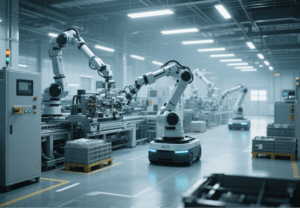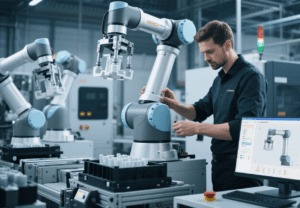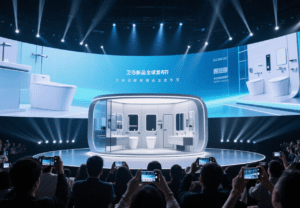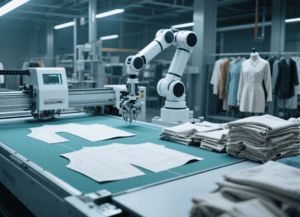
In recent years, China has accelerated the in-depth integration of artificial intelligence and manufacturing, promoting the construction of a number of digital workshops and smart factories.
Today, in many factories across China, a large number of industrial robots and fully automated production lines have emerged. These futuristic and technology-filled production scenes have become hot topics among many foreign media.
Intelligent Manufacturing Transforms Chinese Factories
Recently, the intelligent production scenes of factories in many parts of China have attracted the attention of Brazil’s Forum magazine website: In the factory of Aptiv Central Electric (Shanghai) Co., Ltd., robots, CNC machine tools and AGVs (Automated Guided Vehicles) are busy working. The CNC machine tools, controlled by computer programs, can precisely process various materials such as metals, wood and plastics; In SAIC MAXUS intelligent factory in Nanjing, Jiangsu Province, customers can choose from thousands of configurations, customize their desired models within minutes, and track the production progress in real time after placing an order; As one of China’s largest steel producers, Baowu Iron and Steel Group plans to deploy more than 10,000 “Baoluo” robots by 2026, supported by an intelligent cloud platform…
“These are examples of how intelligent manufacturing is transforming factories,” reported Brazil’s Forum magazine website. In recent years, “lighthouse factories”, unmanned factories and smart factories have emerged in large numbers in China. Data shows that by the end of 2023, China had cultivated 421 national-level demonstration factories and more than 10,000 provincial-level digital workshops and smart factories. A person in charge of relevant departments in Shanghai recently stated that the smart factories built in the city have increased production efficiency by an average of 50%, reduced operating costs by an average of 30%, and driven a cumulative decrease of 13.8% in energy consumption per unit of added value. In this regard, the media commented: “The improvement in productivity of these factories allows us to understand how new productive forces are driving the high-quality growth of the world’s second-largest economy.”
At present, the pace of digital transformation of China’s manufacturing industry is accelerating, and the level is continuously improving. New-type factories empowered by intelligent manufacturing technologies are emerging, attracting the attention of many foreign media.
France’s Les Échos website reported that the robotization process of Chinese industry is advancing rapidly. From 2011 to 2020, the delivery volume of industrial robots in China increased by an average of 27% per year, far higher than the global (12%) and Japanese (6%) growth rates. According to data from the International Federation of Robotics, in 2022, China installed more than 290,000 industrial robots, which is 6 times that of Japan, 7 times that of the United States, 12 times that of Germany, and 40 times that of France. In 2023, the installation of new industrial robots in China alone accounted for more than half of the global total. At present, there are more than 1.5 million robots operating in Chinese factories, which is twice that of Europe.
At the end of 2023, the World Economic Forum announced the latest list of “lighthouse factories”. Among the 21 newly promoted manufacturing “lighthouse factories”, 11 are located in China, including high-tech enterprises in photovoltaic, automobile, new energy and other fields. “Lighthouse factories” are known as “the world’s most advanced factories”. Through digital, networked and intelligent means, and using advanced artificial intelligence large-model technologies, they realize full automation and precision in the production process, and are considered by the industry to represent the leading level of intelligent manufacturing and digitalization in the global manufacturing field. At present, among the 153 “lighthouse factories” worldwide, China has 62, making it the country with the most “lighthouse factories” in the world.
Russia’s Trud website published an article stating that China is one of the world’s leaders in the development and use of artificial intelligence. The country has built fully automated seaports and large warehouses, which can operate with the help of technologies such as artificial intelligence with almost no human participation. This helps reduce transportation costs and improve the competitiveness of Chinese goods. In addition, there are smart factories and agricultural complexes. In China, the use of automated planting technologies is common. Drones are widely used to check crop growth and fertilize and spray pesticides on them.
Rapid Development of the Artificial Intelligence Industry
Foreign media believe that the development level of China’s intelligent manufacturing has jumped significantly, which is closely related to China’s emphasis on the development of artificial intelligence.
Russia’s Trud website stated that China regards artificial intelligence as a priority development direction and has invested heavily in research and development in advanced technology sectors. In 2022, China’s total investment in research and experimental development across society exceeded 3 trillion yuan, an increase of 10.1% over the previous year. In the same year, China’s research and development investment intensity (the ratio of research and development funds to GDP) was 2.54%. In addition, another global advantage of China also helps it achieve breakthroughs in the field of artificial intelligence – its world-leading position in the field of supercomputers. A considerable number of the world’s 500 most powerful and fastest computers are operating in China.
The New York Times of the United States noticed that in recent years, the number of talents trained in China has jumped. The newspaper said that research results show that in terms of certain indicators, China has surpassed the United States to become the “largest producer” of artificial intelligence talents, and China has trained almost half of the world’s top artificial intelligence researchers. The report quoted Subbarao Kambhampati, a professor at Arizona State University and an artificial intelligence researcher, as saying: “Chinese scholars are basically in a leading position in the field of artificial intelligence.”
Singapore’s Lianhe Zaobao website published an article stating that China is determined to promote the transformation from “manufacturing” to “intelligent manufacturing”, accelerate the digitalization and intelligentization of key manufacturing fields, and hard technology industries have received policy support, showing the Chinese government’s firm determination to focus on developing the real economy and its efforts to promote new industrialization. To this end, China has increased efforts to implement the industrial foundation reconstruction project, launched major technological equipment research projects, and promoted the high-end, intelligent and green development of the manufacturing industry.
In fact, today, the sense of technology brought by intelligent technologies is not only seen in factories across China.
Recently, a reporter from Singapore’s The Straits Times visited the Beijing High-level Autonomous Driving Demonstration Zone and was surprised to see that for local residents, driverless taxis are no longer a novelty. Booking a driverless ride-hailing service here with a mobile phone is “as simple as downloading an app”.
CNBC reported that with Baidu, Pony.ai and others to provide driverless travel services in the Beijing High-level Autonomous Driving Demonstration Zone, “costs related to drivers have been completely eliminated”. In addition, in the demonstration zone, not only the actual operation of unmanned delivery of fresh food and express delivery has been realized, but also unmanned social services such as retail, police patrols, bus connections, education ,park roaming, and environmental sanitation have begun to integrate into people’s lives.
Argentina’s Clarín website published an article stating that artificial intelligence is occupying an increasingly important position in China’s economy.
Continuously Releasing Innovation Momentum
“More smart factory plans are being implemented across China. Beijing stated that it strives to add 100 smart factories and digital workshops by 2026. Shanghai plans to build 70 municipal-level smart factories this year, and strive to achieve a ratio of more than 70% of them reaching the demonstration and benchmarking level,” Brazil’s Forum magazine website said. Smart factories are gathering new production factors, injecting new impetus into China’s intelligent manufacturing. By quickly embracing the wave of intelligentization, China’s manufacturing industry has begun to empower the global supply chain.
Many foreign media have noticed that the 2024 Chinese government work report proposed the “Artificial Intelligence +” initiative for the first time, stating that “we will deepen the research and application of big data, artificial intelligence, etc., carry out the ‘Artificial Intelligence +’ initiative, and build internationally competitive digital industry clusters”. Foreign media believe that this means that the status of artificial intelligence technology in China’s development is increasing, and China will accelerate the formation of new productive forces and encourage all walks of life to pay more attention to the multi-scenario application of artificial intelligence.
Bloomberg website reported that the scale of China’s artificial intelligence is “amazing”, and China is at the forefront of artificial intelligence in some aspects. China’s “Artificial Intelligence +” initiative is to promote the in-depth integration of artificial intelligence and the real economy by deepening the research and application of artificial intelligence technology.
Singapore’s Lianhe Zaobao website reported that artificial intelligence technologies such as large models will fundamentally reshape the competitiveness of various fields. China’s launch of the “Artificial Intelligence +” initiative is a signal to continuously release innovation momentum in the face of a new round of scientific and technological revolution and industrial transformation, such as the construction of a number of intelligent computing power centers.
“China regards artificial intelligence as a key development field,” The New York Times pointed out. In recent years, China’s artificial intelligence industry has performed brilliantly in fields such as computer vision and autonomous driving. The official website of the World Economic Forum stated that the global upsurge of generative artificial intelligence has promoted many Chinese enterprises to increase investment in research and development of related technologies, and Chinese enterprises are accelerating the integration of technologies such as the Internet of Things, blockchain, cloud computing and big data into specific businesses.








